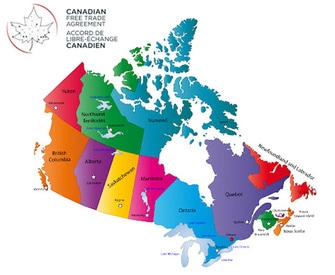 The Peterborough housing market, like others on the periphery of the GTA, is experiencing a supply shortage and an increase in prices. In March, according to the latest numbers from the Peterborough and the Kawarthas Association of Realtors (PKAR), home prices were up 32.5% over March 2016 with an average home price of almost $399,000. More and more, housing is coming up in discussions with employers. How can they build a productive workforce when finding housing can be a barrier to hiring? What does it mean if young families and first time homebuyers can’t afford to put down roots in the city? If these families are pushed into the rural areas, what are the impacts on infrastructure and other socio-economic factors such as education and transportation? When new subdivisions come online (there are a few in the hopper with the City and a number of townships) what are the impacts on roads, tax base, and other basic infrastructure etc? Will people be able to move about with ease to their employment? What are the space requirements and how do those requirements match up to the Province’s growth plan? In response to the situation, the Government of Ontario has introduced Ontario’s Fair Housing Plan. The plan will introduce 16 measures targeted at addressing both the supply and demand side of the housing market. “The Plan covers a wide range of housing issues, and these actions run in concert with numerous steps already taken,” says Ben vanVeen, Realtor, Century 21 United Realty and Treasurer of the Chamber Board of Directors. “I, along with many others, will have to wait to see if they create a more stable environment for renters, buyers, and sellers alike." The Ontario Chamber of Commerce (OCC) has provided a brief overview of some of the more substantial policy measures introduced as part of the plan. Actions to Address Demand for Housing Implement a new 15 percent Non-Resident Speculation tax (NRST) on the price of homes purchased by non citizens or permanent residents of Canada or by foreign corporation. Actions to Protect Renters Expand rent control to all private rental units in Ontario, including those built after 1991. Actions for Municipalities Introducing a targeted $125 million, five year program to encourage the construction of new rental apartment buildings by rebating a portion of development charges Providing flexibility to municipalities to use property tax tools to enhance development opportunities
Other Actions Working with municipalities to better reflect the needs of a growing Greater Golden Horseshoe through an updated Growth Plan Establish a Housing Advisory Group that will meet quarterly to provide ongoing advice about the state of the housing market and discuss the impact of measures announced in the Fair Housing Plan Along with the 16 point plan the government also intends to review the Residential Tenancies Act (RTA) and the legislation governing realtors The OCC Position We are encouraged that the government has committed to working with municipalities to remove the barriers to getting more new homes and listings on the market faster. While we acknowledge that the government is taking action to ensure affordability, we believe that measures should target increasing supply and protecting landlords while encouraging new opportunities for growth. We encourage the province to keep a close eye on what impact these new policy measures will have on housing supply going forward. Peterborough Chamber Position As is the OCC, we will be keeping an eye on how these measures are working for our communities. We are committed to keeping the Chamber’s 900 members informed about the City of Peterborough’s re-examination of its Vacancy Rebate program and any public consultations or information gathering opportunities. Peterborough is in a unique position to be a great landing place for employers and for new businesses to be created and grow. Housing is a foundation of that equation. The City of Peterborough is considering changes to the Vacancy Rebate Program and they are looking for feedback from the business community.
The options presented to City Council on Monday, April 24, 2017 were:
4. Revise the current program. Potential changes that may be considered include reducing the rebate percentage, increasing the minimum period of vacancy and limiting the property types eligible for the program. Please take a moment to read the suggested changes: Briefing on Vacancy Rebate Program Please submit your comments to [email protected] no later than noon, Wednesday May 10, 2017. Following the consultation process City Staff will be bringing a report and final recommendations to Council for their Committee of the Whole meeting on May 29, 2017 and expected final approval on June 5, 2017 meeting. If you have any questions, please contact Kim McPhail at 705-742-7777 ext. 1792. Open House: The City of Peterborough will be holding open houses at City Hall, 500 George Street North on Tuesday May 9, 2017 from 2:00 p.m. to 4:00 p.m. in the Doris Room and from 6:00 p.m. to 7:00 p.m. in the front foyer.  That the federal government introduced the ‘Cannabis Act’ recently is not a surprise. It was part of the 2015 election platform. The goal of the proposed ‘Cannabis Act’ is to create a strict legal framework for controlling the production, distribution, sale and possession of cannabis across Canada. In a Financial Post article in October 2015, it was stated that legalizing recreational marijuana would create a market worth up to $5 billion. At the Ontario Chamber of Commerce (OCC) Annual General Meeting (AGM) in May 2016, the Chamber Network voted and passed a resolution encouraging the provincial government to do the following:
In September 2016, the Ontario Chamber of Commerce, with the support of the network, also sent a letter to the provincial government suggesting five guiding principles when developing the policy around design of a recreational marijuana distribution system. With the tabling of the ‘Cannabis Act’ there are clearly defined roles for the federal, provincial and territorial governments. The federal government will design the framework to legalize recreational use of marijuana and the provincial and territorial governments will develop legislation around distribution and sales. Given the role the provincial government will play heading toward implementation in July 2018, it is worth highlighting the five design principles related to distribution that the OCC wrote about last fall. Eliminate the underground economy: Ensure that the chosen market model is not so overly regulated or onerous that it duplicates the current regime thus sustaining illegal channels for production and distribution Limit points of access: A licensing system, whereby a fixed number of access points are auctioned out to both the public and private sectors, may be a more efficient model of regulated delivery. The OCC also suggests creating a service delivery competition to spur innovation around best-practice social responsibility standards Communities must be empowered: Engage local governments in the decision-making process with the awareness that some have voted against production and/or distribution facilities Invest in addiction prevention and treatment: Invest any revenues from the legalization of marijuana into addiction prevention and treatment with a portion given to the municipal level of government so as to ensure programming is tailored to local need. Report annually to the Ontario’s Patient Ombudsman on the impact of the investment of marijuana revenues on addiction prevention and treatment Ensure products are subject to best-practice health regulation: Work with the federal government to study the health implications of recreational marijuana and develop evidence-based health and safety regulations The desired outcome of a marijuana strategy is one that includes the private sector as an effective partner in a socially responsible distribution system and that municipal governments also have a seat at the table in the development process of a strategy. In response to the letter from the OCC, the Ontario government said it was participating in the federal government task force that consulted with jurisdictions. The Ontario government also stated that an inter-ministry committee has begun research and background work and will take a steady approach in shaping a marijuana legislation framework. For more information: www.canada.ca/en/services/health/campaigns/legalizing-strictly-regulating- cannabis-facts.html  Late last week, after nearly two years and 21 rounds of negotiations, the federal, provincial, and territorial governments announced the details of a new Canada Free Trade Agreement (CFTA). To finally see details and agreement on a new interprovincial trade deal for Canada is an important milestone. The last agreement was from 1995. The Ontario Chamber Network has been a strong advocate to the provincial and federal levels of government to ensure a deal was in place before the ratification of other trade deals, such as CETA. “The new Canada Free Trade Agreement is a huge win for business. Eliminating interprovincial barriers to trade has long been a priority of the Canadian Chamber,” said the Hon. Perrin Beatty, President and CEO of the Canadian Chamber of Commerce. “As Canada pushes back against growing protectionist sentiment around the world it is crucial that we get our own house in order and the CFTA puts us on a path to do that.” The Ontario Chamber of Commerce (OCC) reiterates the positive nature of the CFTA in that interprovincial trade makes up one-fifth of Canada’s GDP, a total of $385 billion. The Ontario government predicts the CFTA could raise Ontario’s GDP by up to one percent by 2025, or more than $9 billion. What are some of the key details? Comprehensive free trade rules of engagement The CFTA replaces the existing Agreement on Internal Trade (AIT) and will employ a “negative-list” approach, covering nearly all sectors of the economy. CFTA’s rules will automatically apply to almost all areas of economic activity in Canada, with any exceptions being clearly identified; meaning the default status of intra-provincial trade is “free”. Government procurement that is more open to Canadian business The CFTA will implement a single electronic portal, which will make it easier for Canadian businesses, especially small and medium-sized companies, to find procurement opportunities across the country. The intent is to include provincial, territorial, and municipal contracts within five years. Alignment with international obligations The CFTA will better align with Canada’s commitments under international trade agreements such as the Canada-European Union Comprehensive Economic and Trade Agreement (CETA), which will reduce compliance costs for Canadian firms. Resolving regulatory barriers The CFTA will establish a regulatory reconciliation process to address regulatory differences across jurisdictions that act as a barrier to trade. The CFTA will also introduce a mechanism to promote regulatory cooperation, which will equip governments with the ability to develop common regulatory approaches for emerging sectors. However, there are still some areas that require more attention. The Ontario Chamber of Commerce says the new CFTA has several forward-looking processes and working groups to help strengthen Canada’s economic union into the future. This includes a commitment to establish a working group to evaluate options for liberalizing trade in alcohol, allows for future negotiations on the financial services sector, and includes a commitment to enhance the territorial food sector. The Peterborough Chamber of Commerce has heard from many members that interprovincial trade is overly onerous because of varying regulations and restrictions that can leave small and medium-sized businesses on the outside looking in. A new deal that covers most sectors of the Ontario economy and encourages more trade east to west and west to east is one to be celebrated. Fittingly, the new Canada Free Trade Agreement will come into effect on July 1, 2017. From March 20-24, 2017, Sandra Dueck had the opportunity to be the first policy intern from the Chamber network to spend a week with the Canadian Chamber of Commerce policy team. She survived. This is her story. Driving down Highway 7 to Ottawa recently I had a solid three hours to visualize what my week as a policy intern with the Canadian Chamber of Commerce (CCC) would be like. And in all honesty, it went as I envisioned it - a high energy week in the bubble of federal politics. It was a flurry of meetings, including joining my counterparts at the Sault Ste. Marie, Hamilton and Windsor chambers to support them during their presentation to the International Trade Standing Committee. I also participated with those chambers in meetings with a BC MP and the Ontario Regional Policy Advisor to the Minister Responsible for Small Business. A breakfast session presented by IPolitics called Troubled Waters: Clean Water for First Nation Communities? was an eye-opening, frank and important conversation on the politics, need and desire to find solutions. I had the opportunity to dine in the Parliamentary Dining room; tour the Ottawa office of my local MP, Maryam Monsef, Minister Status of Women; attend an event at the newly constructed Ottawa Innovation Centre; conduct one-on-one meetings with the policy team; and, during the weekly policy staff meeting inform them about the issues facing Peterborough.
However, the anchor event of the week was the federal budget on Wednesday, March 22nd. I had never been to a budget lockup before and the thought of surrendering my phone and all connection to the outside world for six hours was a bit daunting; but in the end, the six hours flew by. I learned budget reading tricks of the trade from Hendrik Brakel, Senior Director Economic, Finance & Tax Policy for the CCC and watched how he broke it down, got a feel for the overall direction and wrote the budget analysis for the CCC President & CEO Perrin Beatty and the Chamber Network. I was honoured to have written the rough draft of the skills section of the report and help find those nuggets that would interest the Chamber Network on our post-budget call later that evening. By the time it was approaching 4:00pm my copy of the budget had been thoroughly thumbed through, bent and highlighted, and we were ready to burst back into the world to get the details to the Canadian Chamber media team. But in true Ottawa fashion, politics waits for no budget and our exit from lockup was delayed by filibustering by the opposition. The masses of economists (there were two full rooms) were held off for an extra 30 minutes waiting, testing out talking points and itching to leap out the doors as soon as word came that the Finance Minister had tabled the budget in the House of Commons. I should add that an amazing amount of preparation goes into being ready for the budget by the policy team. The six other policy analysts feed Hendrik with what they anticipate seeing in the budget with regards to their area of specialty and then after the lockup it’s a highly coordinated effort to connect with the Network via conference call and the media through the President & CEO. The week wrapped up with a debrief breakfast and the bubble of federal politics intact; though the filibustering, that continues even as I write this, added another layer of political intrigue to my experience. The intern program was invaluable for me as the policy analyst of a local chamber of commerce. To have access to and build familiarity with the CCC policy staff only serves to help me help our members. To the policy team - thank you and don’t worry, I’ll be in touch. Thank you to Senior Vice President of Policy Warren Everson for being out of town and lending me your office for the week;) and to Brighid Meldrum and Jennifer Hagen, thank you for making the week easy to navigate. BUSINESSES NEED MORE SUPPORT TO LIMIT CAP AND TRADE IMPACT: PETERBOROUGH CHAMBER OF COMMERCE OCC Calls on Premier Wynne to Prevent Exporting Jobs During the Transition to a Low-Carbon Economy PETERBOROUGH, ON: The Ontario Chamber of Commerce (OCC) with the support of the Peterborough Chamber of Commerce, sent an open letter to Premier Kathleen Wynne calling on the government take action through Budget 2017 to contain the costs of the cap and trade system to better support Ontario’s business community. At a time of low business confidence across the province, and increasing competition from the United States, rising input costs for Ontario business risk negatively impacting jobs and investment in Peterborough and across province.
In the letter, the OCC warns that the province must measure the impact of cap and trade among other input costs to fully understand the cumulative burden facing Ontario’s business community. Because businesses are directly affected by the costs associated with cap and trade, the Government of Ontario must ensure that the revenue and design of the system is allocated and developed in a way that supports Ontario’s business community. “In a recent survey, our members expressed concern because they don’t know how much this program is going to cost them and uncertainty is challenging for business,” said Stuart Harrison, President & CEO, Peterborough Chamber. “Along with the OCC, we are calling on the Premier to take action and support our businesses and local economy.” The OCC has identified four priority actions that would assist the business community to better navigate the cap and trade system:
“Increased input costs imposed on the private sector mean that Ontario risks losing out on jobs and investment, and risks an economically and environmentally damaging shift in production to jurisdictions that are not taking action to reduce their greenhouse gas (GHG) emissions,” said Graham Henderson, Chair of the Ontario Chamber of Commerce. “More action must be taken. In all policy decisions, the provincial government must consider how we can prevent exporting jobs while importing pollution.” The letter is aimed at impacting government policy in Budget 2017, and builds on the OCC’s meetings with senior government officials. These meetings have emphasized the need to ensure Ontario’s businesses remain competitive and confident in the face of a changing economy. The Peterborough and Ontario’s Chamber Network have engaged in significant advocacy on the cap and trade issue since 2015. This letter builds on the OCC’s earlier communications to government calling on the Ontario Energy Board to disclose cap and trade costs to taxpayers as a line-item on natural gas bills. Last year, the Ontario Chamber Network also called on the government to delay the implementation of the cap and trade system until 2018. Read the Letter -30- Media Contact: Sandra Dueck, Policy Analyst/Communications Specialist Peterborough Chamber of Commerce 705.748.9771 x215 [email protected]  Last week over 60 chambers of commerce from around the province made the trek down to Queen’s Park for a day of advocacy with the Ontario Chamber of Commerce (OCC). The long list of Ministers we heard from started with the Hon. Brad Duguid, Minister of Economic Development, who praised the Chamber Network for its active solutions-based advocacy on behalf of the business community. Steve Orsini, Secretary of the Cabinet, Head of the Public Service, and Clerk of the Executive Council, also spoke to set the tone for the day. He reiterated the need to work together to achieve results, highlighting the issue of skills development and the role of business in that particular conversation. After a quick photo op on the steps inside Queen’s Park we moved over to the Great Hall at Hart House (a grand room reminiscent of Hogwart’s). There, the discussion turned to the 2018 election and we heard from Peterborough’s Catherine Fife, who is the MPP for Kitchener-Waterloo, and Nipissing MPP Vic Fedeli. They identified hydro costs, the needs of small business, infrastructure, the skills gap and the need for a more holistic approach to the economy as issues to drive election conversation on the road to the ballot box. Next was the Town Hall with three cabinet ministers:
The Minister of Energy, Glenn Thibeault was up next and spoke about a time of use study the ministry is undergoing to determine the true impact and benefit. In response to a question I asked on the underlying challenges of the energy file outside of the cost of the commodity, he mentioned market reform and finding appropriate ways to pull costs out of the system. On the Green Energy Act, he said the “what” was never the issue; but said, “how” the government went about it didn’t work. Peterborough MPP Jeff Leal settled into the hot seat and fielded questions on clusters, supply management, scaling up, and school closures. He mentioned careers in agriculture and agri-food are going to be in high demand in the future and hopes we can successfully encourage new Canadians to bring their talents and skill sets to our rural communities. After a chance to grill the ministers, the chamber delegates dispersed to 13 different locations to meet with senior government officials on a number of issues. Along with representatives from the Whitby, Ajax-Pickering, East Gwillimbury, and Stony Creek Chambers of Commerc, I met with officials on regulatory burden and the Red Tape Challenge. During that meeitng we were able to put out the call for small business to be considered a sector to be examined under the Red Tape Challenge. The meeting also featured a presentation from Ministry staff about the service they cover and discussion around a one stop shop concierge service for business and how to better leverage online services. The meeting Stuart Harrison attended was with the Ministry of Labour; Deputy Minister Sophie Dennis and Assistant Deputy Minister Marcelle Crouse. The Chamber network representatives included Ottawa, Toronto, Whitby, Burlington, Brantford, Owen Sound, Newmarket, Mississauga and the OCC. The topics covered included the expected final report of the Changing Workplaces Review, and Interest Arbitration, which is the only legal mechanism available to Ontario Municipalities for settling disputes from contract negotiations with essential services such as fire, police and paramedics. On Interest Arbitration, the Ontario Chamber network has been lobbying the government for changes that would take into account a municipality’s ability to pay. We were able to demonstrate to Ministry staff some of the dramatic statistics, such as Owen Sound, where emergency services accounts for 46% of the municipal budget. In Peterborough, that number sits at 29.8% of the municipal budget. While this certainly got the attention of Ministry staff, the ensuing discussion concentrated on the difficulty any arbitrator would have in establishing such a subjective measurement. We were advised to work with the Ontario Association of Municipalities to develop specific changes to the system. On the Changing Workplaces Review we were left with the impression that the Ministry had a solid understanding of the balance that will have to be achieved between employer and employee when this legislation is written. While the narrative of “precarious employment” has been dominant, we felt the Government understood the realities of how Ontarians are choosing to work. The day wrapped up with a meet and greet reception with the party leaders, including the Premier. Days like Queen’s Park Advocacy are important for the membership of Chambers of Commerce such as Peterborough. It was our opportunity to take advantage of the access to the ministers and policy makers at our provincial legislature and we made sure to make the most it. We are looking forward to next year. |
AuthorThe Peterborough and the Kawarthas Chamber of Commerce acts as a catalyst to enhance business growth, opportunity, innovation, partnerships and a diverse business community. Archives
June 2024
Categories |
|
Copyright Greater Peterborough Chamber of Commerce. All rights reserved.
175 George Street North, Peterborough, ON, K9J 3G6 Phone: (705) 748-9771 | (705) 743-2331 Home | Calendar | Site Map | Privacy | Accessibility |
